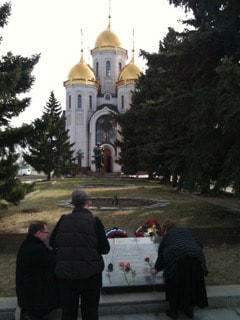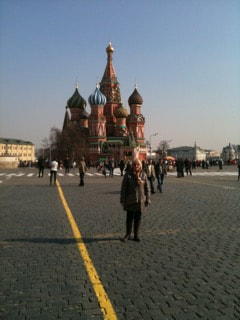Performing 'The Armed Man' in Volgograd
|
Editor's Note: Brian and Mo sing with a number of choirs and go on many trips singing to receptive audiences – here’s one of these stories.
By BRIAN WILSON UK Travel Correspondent Special to North Palm Beach Life 
The Russian audience had filled the Opera House and gave a fantastic reception – would the applause ever end? We had just performed "The Armed Man" in Volgograd
Have you heard "‘The Armed Man"? The music is very powerful and is based on the Catholic Mass but also incorporates texts from Islam, the Bible and Sanskrit sources as well as works by Rudyard Kipling, Alfred Lord Tennyson, and others. "The Armed Man" charts the descent into and horrors of war and ends with the hope for peace. It starts with a 15th century French song ("The Armed Man"), the Kyrie asks "Save us from bloody men." The Sanctus has a military, menacing air and is followed by a lone trumpet playing the Last Post. The Agnus Dei is followed by "Now the Guns have Stopped" and after the Benedictus, "Better is Peace" ends the Mass on a note of hope. But let’s start at the beginning. Mo and I sang with a choir called The Harry Ensemble conducted by Edward Harry and we were rehearsing "The Armed Man," as the composer, Karl Jenkins, was a patron of the choir. Edward had also been communicating with one of the leaders of Volgograd’s Opera House, who then invited the choir over to perform this outstanding work. So a few months later, in March 2013, a choir of 20 singers boarded an Aeroflot flight to Moscow, then onto Volgograd. Have you heard of Volgograd? Well it is in the Southeast part of Russia and sits on the Volga River. Still not heard of it – then, if I told you it used to be a called Stalingrad, it will "ring a bell." This was perhaps the greatest confrontation in World War 2 where the Russian army held the German army for months. The city was demolished; men fought and died for inches, all ending in February 1943 in the depths of the freezing Russian winter. We realised that this performance would be close to the 70th anniversary of the end of this battle – that "raised the hairs on the back of your neck." Let’s turn to travel – I would not recommend Volgograd for a holiday, unless you were researching the battle! The city has been rebuilt and so much of the architecture is standard communist edifices, so boring! But there are a number of beautiful Russian Orthodox Churches like All Saint‘s Church. We were able to stroll around Volgograd, the older people looked wearingly at us, but the younger people came up to practice their English and to find out more about life in general (we realised that they hungered for news and looked to western countries for music and other aspects of our life style.)
There is one major reason to visit Volgograd – "The Motherland Calls." You’ll find it on the hill looking down on Volgograd called Mamayev Kurgon. It was here that the fiercest fighting took place. You can stand here and look out towards the fertile Russian steppes that roll out to the infinite horizon. But your eye cannot get away from the massive 85 metre (215 foot) high statue that commemorates the ending of the battle. I believe it is the tallest statue of a human and is some 40 percent taller than the Statue of Liberty.
Whilst you are up on the top of this hill you can get other reminders of the battle – the Eternal Flame and statues commemorating bravery. Okay, the statues could be considered as a bit "over the to"’ and examples of Communist bravado, but they do commemorate an important part of Russian history. It was early March when we arrived to start our rehearsals at the Opera House that had seen better days and it was obvious that the Russian economy was not being kind to Volgograd. We found we were singing with members of the Opera Chorus and the Orchestra, yet it was soon obvious that music is a common language to all. Do you know much about Russian singers? Well, the sound they make is unique. Russian basses can sing very low notes and they sing "from the stomach" to get that typical Russian sound. I am a second bass – I sing low notes and we made friends with the Russian basses. I noticed that they were sometimes singing a note an octave lower and looking at us with a smile. Not to be outdone, the next time, they turned and smiled at us, so we went down the octave to their silent applause. After that, we got together to sing Russian music – they were amazed we could sing in Russian, but we had to tell them that we could not speak it (I can say "God be with you," but "When is the next train" is beyond me! To show you how a Russian Choir sounds – listen to Bogoroditse Devo (Ave Maria) by Serge Rachmaninov (from his Vespers). The best and truest sound comes from a Russian Choir but Mo and I have sung in a vaulted church and the sound was tremendous - listen for the low bass notes: Part of the "Armed Man" is the playing of "The Last Post" and the Russian trumpeters were having some difficulty. So the other Russian singers and players started to talk quietly, much to the annoyance of our conductor. He asked our Russian speakers to explain what "The Last Post" is and when it is played - you could hear a pin drop. With one voice they turned to the conductor and then to us and said "sorry." It was obvious that the bravery of our armed services and the horrors of war is deep in the Russian soul. The Russian trumpeter was even more impressed when he was told that "The Last Post" is played on a bugle ( a brass instrument with no valves – all notes are made with the lips).
When we walked onto the stage for the performance we were impressed to see it so full – we were singing in English to Russians!! Then we noticed a number of very old men festooned with medals – the few of Stalingrad’s defender still alive. Our performance went without a hitch and there was continuous, rapturous applause. Afterwards, one of the most poignant images was when of one of these old soldiers came up, saluted the conductor and shook his hand. This old warrior then looked at the choir and simply said, with tears in his eyes "Thank you" in Russian and English. It was then back to the hotel and onwards to Moscow – but more of that later. |
List of All 'Life in the UK' ArticlesThe Music |



